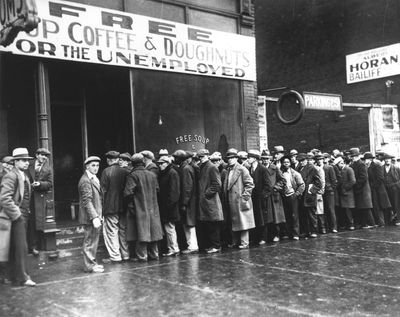Related Topics
Right Angle Club 2017
Dick Palmer and Bill Dorsey died this year. We will miss them.
Equities, Not Debt

|
| Great Depression |
I confess to this feeling in myself: stocks are riskier than bonds. So I don't blame a lot of other people for having the notion left over from the Great Depression of the 1930s that stocks can suddenly drop, whereas bonds are rock-solid investments. That is an obsolete viewpoint which I know is obsolete, but I still have it. Governments have learned that issuing more bonds dilutes the ownership shares, effectively making the sovereignty risk the same, for both. But what makes this work is to go steadily deeper into debt. We established the rate at 2% a year, but wars and other catastrophes make it more than that. When we reach our limit, leadership changes, but we don't stop adding debt. We don't like to see that, so we skirt around it. Something will turn up.

|
| Robert Morris |
So let's look at history. When Robert Morris was running America's affairs during the Revolutionary War, he formed the opinion that governments should borrow all their revenue, while businesses might sell ownership shares to raise money. Corporations were just getting started in this era, but Morris extended this idea to the modern era when he was a delegate to the Constitutional Convention in 1789. Apparently, he did a lot of talking in private, but this concept is tightly identified with him, allowing it to appear to be almost his sole contribution to the subsequent capitalist republic. It was a two-step method for individual citizens to control the behavior of a strong central government. During the early decades of the Republic, the banking system emerged, and it evolved that big corporation sold bonds in bulk to create indebtedness, while individuals and small businesses usually borrowed smaller amounts from banks. When the economy collapsed after 1929, the impression was reinforced that bonds were strong, stocks were unsafe, and bank deposits were especially unsafe. That's not necessarily the case.

|
| U.S Mint |
The process of gradually going off the gold standard created slow steady inflation of the currency, so a dollar in 1913 was worth a penny, a century later. Indeed, it now costs the U.S. Mint two cents to produce a penny. The slowness of this attrition allowed a trade to function during the century, and stocks accordingly rose, but the fixed value of bonds made them relatively unsafe over longer periods of time. After a brief, disastrous, flirtation with negative interest rates, bond prices limited their declines to the "zero bound", and sensible people avoided bonds as an investment. Speculators might make big profits from minor fluctuations, since doubling fractions of one percent could be leveraged to big speculative profits, up and down. But these profits were of the "zero-sum" variety, meaning all profits were at the expense of your counterparty's loss. Stocks, on the other hand, could make profits on a "win-win" basis. True, they could also lose on a "lose-lose" basis if inflation got out of control, but at least there was some chance of financial survival. Generally speaking, however, the position of stocks and bonds had been reversed, and bonds were riskier. Governments don't like to have that acknowledged since the Morris system confined all of their revenue to bonds. No one would freely buy government bonds if everyone believed this analysis. Except weakened governments, ultimately limited by the "zero bound".

|
| Stock Market |
No strong case is improved by exaggeration. There is still plenty of risk in the stock market. The aggregate value of stocks can go up and down, as a reflection of the ups and downs of the whole economy. But it is true that corporations increasingly form the bulk of the national economy, represented by their shares on the open market. Governments are usually restricted to borrowing for revenue and, reaching the limit of their borrowing power, they are impelled to expand the scope of government spending. A resort to socialist systems is usually a sign of desperation soon to be disappointed, although socialism might possibly work when you don't need it. When you hear socialism praised, it is questionable if even reserves will save you because socialism (government control of production) wastes reserves even faster.
REFERENCES
| Robert Morris: Financier of the American Revolution | Amazon |
Originally published: Tuesday, January 10, 2017; most-recently modified: Thursday, May 16, 2019